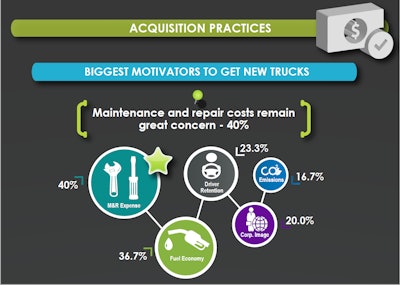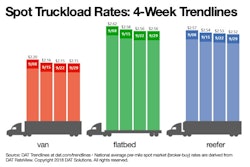
Maintenance and repair (M&R) remains the top consideration when replacing trucks, according to the results of Fleet Advantage's latest annual benchmarking survey taking the pulse of fleet executives on a variety of industry issues. The online survey, presented to more than 1,000 fleet operators during August, covered topics such as the outlook for electric and hydrogen fuel-cell trucks; fuel economy trends; and how they view M&R, safety and driver retention.
Forty percent of respondents listed M&R as their top motivating factor for acquiring new trucks. M&R costs have become front and center in recent years, with more fleet personnel working with their finance departments according to show them how significant M&R costs are to lowering their overall fleet costs.
However, the survey shows that costs are not the only concern fleets have regarding maintenance; 26.7 percent also believe a safe, well-maintained truck is most beneficial in driver recruitment and retention—critical since the driver shortage remains a difficult issue for many transportation companies. Only compensation ranked higher as most beneficial in driver retention at 50 percent.
Fuel economy ranked second (36.7 percent) as a top motivator for truck replacement. This is especially important since 86 percent said they’ve experienced a consistent increase in fuel economy in model years 2013 through 2018. This perspective is further underscored by the fact that the recent price of diesel has increased above what industry forecasts projected. According to the latest North American Council for Freight Efficiency (NACFE) and its 2018 Annual Fleet Fuel Study, diesel recently increased to $3.28 per gallon, surpassing its projection of reaching just $2.72 in 2018.
The survey also asked a handful of questions on the topic of electric and hydrogen fuel-cell trucks. Only 4 percent of respondents said they are currently procuring these types of trucks, and 53 percent said they either do not see the value nor will they consider the technology for at least another 10 years. Nearly a quarter of respondents (21 percent) also said they believe electric or hydrogen fuel-cell trucks will never be widely used for over-the-road operations. As for their reasons, 39.4 percent said they will not consider the technology because of limited fueling or charging station infrastructure, and 33.3 percent have concerns over the vehicle’s range or fuel economy.
“There continue to be several important issues shaping today’s transportation industry, many of which prompt fleets to make decisions that can greatly impact everything from their ability to attract drivers to their financial bottom line,” says Brian Holland, president and CFO of Fleet Advantage. “Gaining a better understanding of how industry professionals view topics such as fuel economy, truck replacement and electrification helps us better understand where their asset strategies are headed, and thus we can provide the proper consultation to help them make profitable decisions.”

















